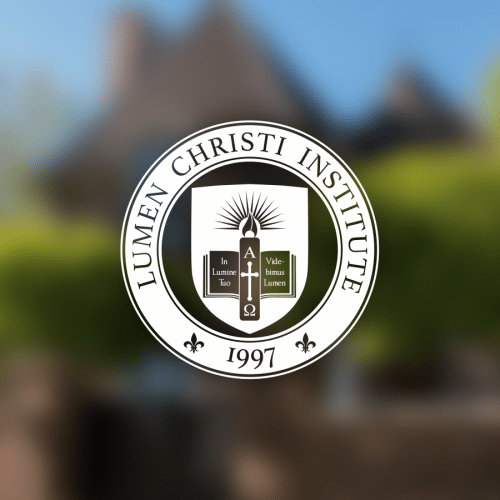American philosopher Allan Bloom received wide recognition for his 1987 book The Closing of the American Mind—a scathing critique of culture and contemporary American higher education. What most people don’t know is that he intended to title the book, Souls Without Longing. But his publisher—worried about the practical aspect of selling books—suggested he rethink it: “our public doesn’t know what a soul is and what longing is.”
It has been 28 years since Bloom exposed the hollowness at the heart of an American culture so open to relativism that it was closed to truth. And there still is a metaphysical void—especially on college campuses where students inquire but doubt their ability to know.
Desiring that students regain confidence in their ability to talk about life’s important questions, Stephen L. Brock—Professor of Medieval Philosophy at the Pontifical University of the Holy Cross in Rome—will be leading Lumen Christi’s seminar for graduate students this summer (June 19-24, 2015) on “Metaphysics and the Soul in Thomas Aquinas.” Brock has been leading LCI seminars in Rome for the past several years and thinks the Institute is providing an invaluable service, one that is unrivaled in the academic world. “I don’t know where else you get this,” he says, amazed by the high caliber of students from elite universities (i.e. Harvard, Princeton, Oxford) that attend the seminars preparing themselves to teach texts from the Catholic intellectual tradition.
Like Bloom, Brock is a graduate of the University of Chicago.
When he arrived on campus, he was—as many undergrads—aimless. He had no idea what he was going to study, to do with his life. A class in the Common Core proved life-changing as it introduced him to the thought of the towering eighteenth-century philosopher Immanuel Kant. “I didn’t understand Kant at all; I still don’t,” laughs Brock. Nonetheless, Kant “made me want to do philosophy.”
Brock has nothing but praise and admiration for his alma mater. “There is no place like it,” he says. “The University of Chicago taught me how to read a book, how to listen,” he explains. Students are privileged to study with “big name” professors who are passionate about what they do in the classroom. “I never had a teaching assistant; that is really special,” he says. What is even more valuable is the environment of intellectual honesty on campus. “U of C professors would never force their own views, which is kind of rare,” Brock says.
The University of Chicago—with its reputation for intellectual excellence—can be a demanding place. He recalls trudging back from the Regenstein Library in the dark after a painful day feeling completely overwhelmed by all the reading and writing that was assigned. “It’s not exactly a party school.” When you look around, “students have that tired look,” he laughs. Sometimes it seemed a sense of melancholy pervaded the campus. But it was because students felt like they were doing something serious.
Today, Brock—having been infected with an enthusiasm for the life of the mind—is doing serious work in philosophy. Though he converted from Methodism to Catholicism while at the U of C, he didn’t think about entering the priesthood until he had almost finished his dissertation on “The Legal Character of Natural Law According to St. Thomas Aquinas” at the University of Toronto.
Brock is now not only a priest, but one of the leading experts on the thought of Thomas Aquinas.
When he was a student, he was blissfully unaware of the controversies surrounding Thomas. He is no longer that naïve. Aquinas, he laments, has a lot of baggage attached to him. Church politics, polemics, disputes, the length of the Summa have all unfortunately distracted many from engaging with the thought of one of the Church’s greatest thinkers, he says. Even Thomists—by treating Aquinas as the “only thinker”—do a disservice to his reputation.
It is a shame because Aquinas is a phenomenal teacher; he really knows how to explain things and is extremely sensitive to the way the brain works. He knows how to help his students avoid dead ends. “He puts to lie the idea that if you make a strong claim to know something that it kills the life of the mind.” It’s very common, Brock says, for students nowadays to inquire. But they are told to question their ability to truly know. “Why bother inquiring if you will never know?”
Aquinas’ view of the soul, for example, challenges our incomplete modern sensibility. “According to Aquinas, animals and plants have souls. Even a rock has something similar to a soul.” All of creation comes forth from God. We are all related in a cosmic hierarchy of being with “the person as what is most perfect in all of nature.” The idea that the soul is, in a way, in all things “is pretty darn big,” says Brock. He is looking forward to engaging graduate students on this topic during the 5-day seminar in June. For Aquinas’ perspective transforms our modern vision of the world that—since Descartes—has become so limited, so diminished—to the point where, as Bloom discovered, we are unable to refer to the soul, even when discussing the human person.


